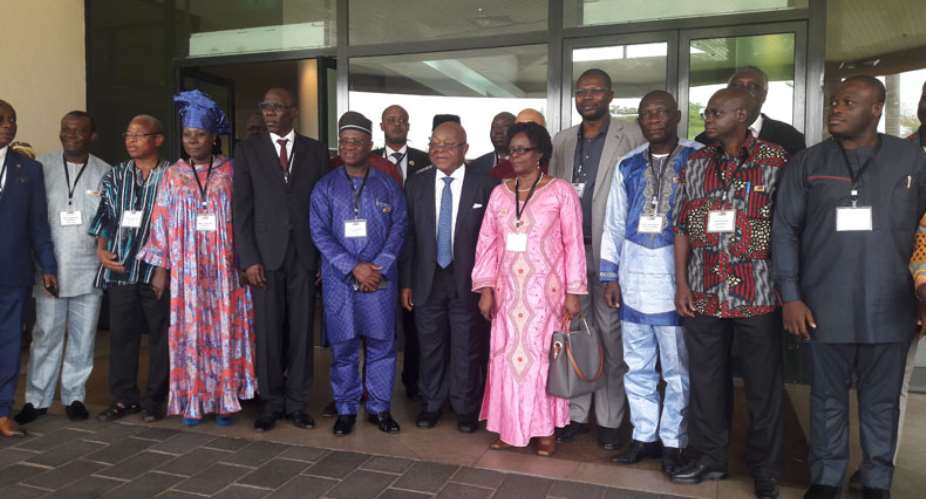Members of Parliaments from 12 African countries have gathered in Accra to chart a path for the fight against corruption, which has become a hindrance to economic development of countries on the continent.
The meeting, which forms part of the 2018 Biennial Meeting of the African Parliamentarians Network Against Corruption (APNAC), is under the theme, “The Role Of Parliamentarians in the Fight Against Corruption and in Achieving the Sustainable Development Goals (SDGs) in Africa.”
Professor Aaron Mike Oquaye, Speaker of Parliament who was the special guest of honour at the opening ceremony, noted that the fight against corruption would be intensified by the passage of the Right to Information Bill, which has been in parliament for the past 17 years.
He expressed reservation about the nature of the bill, particularly about the fact that information could only be sourced from the public sector and not the private sector as well.
According to Professor Mike Oquaye, this is a shortfall as more often than not, private businesses and foreign companies are the sources of corruption; and suggested that the bill must encompass all industry players, so long as their businesses reflect on public activities.
“I was not happy particularly about one aspect, that is, information can only be compelled from the public service but that private businesses, foreign companies and others could not be so compelled. There is a symbiosis between corrupt officials and the business people who they do business with and increase contracts by 10, 20, 30%. Then you won’t by law compel information from the private company which actually much of the time, is the source of the corruption and unfortunately, some of them want protection,” Prof Oquaye queried.
The speaker noted that a lot of responsibilities in the fight against corruption lie on the shoulders of MPs and parliament as a house of accountabilities with an oversight responsibility on the executive.
The Ghanaian speaker said nation building in Africa sometimes tends to be frivolous as members of committees are unable to use their inquisitorial powers properly as a result of poor preparation and research before sitting on committees of inquiry.
He also chided some respectable individuals in society who line themselves up to plead on behalf of people who have been identified to have involved themselves in corrupt practices. “This act,” he charged, “must end if indeed we are committed to curtail corruption.”
'Blame Parliament'
Albert Kan Dapaah, Minister for National Security, chided parliaments on the continent for somewhat overlooking their oversight responsibility over the other arms of government, to effectively combat corruption.
“If in any democratic country you find corruption in the public sector, blame not the politicians; blame not the public servants, but rather blame the parliamentarian and parliament because, that there is corruption in the public sector must be no news. What is news is the breakdown in the accountability process that permitted the corruption in the first place.
“I think parliament is at the centre of it all, if corruption exists in a country, largely because parliament has not exercised its financial accountability role. Come to think about it, the most corrupt president in our continent cannot practise his skills in the developed democratic countries for the simple reason that the checks and balances and accountability mechanisms will not allow him to do that,” he indicated.
Mr Kan Dapaah also questioned the recent attempt by the Auditor-General to begin punishing people before reporting his findings to parliament, which engaged him.
He believes that the report of the Auditor-General must not be deemed to be conclusive until after the Public Accounts Committee has adopted it and parliament's plenary has also adopted it.
Osei Kyei-Mensah-Bonsu, majority leader in parliament who is also the President of APNAC, stated that the network was formed in 1998 to position African parliaments to be able to provide effective oversight over the executive and other constitutional creatures such as the Commission for Human Rights and Administrative Justice (CHRAJ), National Media Commission, among others.
He stressed the need for other committees of parliament to strengthen their existence as the Public Accounts Committee, to enable legislators to perform its oversight duties effectively.
The meeting would be used to elect new executives for the Network.
BY Gibril Abdul Razak





 Dumsor: Mathew Opoku Prempeh has been disrespectful, he should be fired – IES
Dumsor: Mathew Opoku Prempeh has been disrespectful, he should be fired – IES
 NPP prioritizing politics over power crisis solution — PR Strategist
NPP prioritizing politics over power crisis solution — PR Strategist
 E/R: Gory accidents kills 3 persons at Aseseaso, several others critically injur...
E/R: Gory accidents kills 3 persons at Aseseaso, several others critically injur...
 Nobody can come up with 'dumsor' timetable except Energy Minister – Osafo-Maafo
Nobody can come up with 'dumsor' timetable except Energy Minister – Osafo-Maafo
 Dumsor: You ‘the men’ find it difficult to draw timetable when ‘incompetent’ NDC...
Dumsor: You ‘the men’ find it difficult to draw timetable when ‘incompetent’ NDC...
 We’re working to restore supply after heavy rains caused outages in parts of Gre...
We’re working to restore supply after heavy rains caused outages in parts of Gre...
 NPP government plans to expand rail network to every region — Peter Amewu
NPP government plans to expand rail network to every region — Peter Amewu
 Dumsor must stop vigil part 2: We’ll choose how we demonstrate and who to partne...
Dumsor must stop vigil part 2: We’ll choose how we demonstrate and who to partne...
 2024 elections: NDC stands on the side of morality, truth; NPP isn't an option —...
2024 elections: NDC stands on the side of morality, truth; NPP isn't an option —...
 Akufo-Addo has moved Ghana from 'Beyond Aid' to ‘Beyond Borrowing’ — Haruna Idri...
Akufo-Addo has moved Ghana from 'Beyond Aid' to ‘Beyond Borrowing’ — Haruna Idri...
